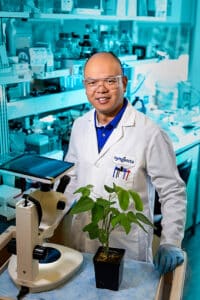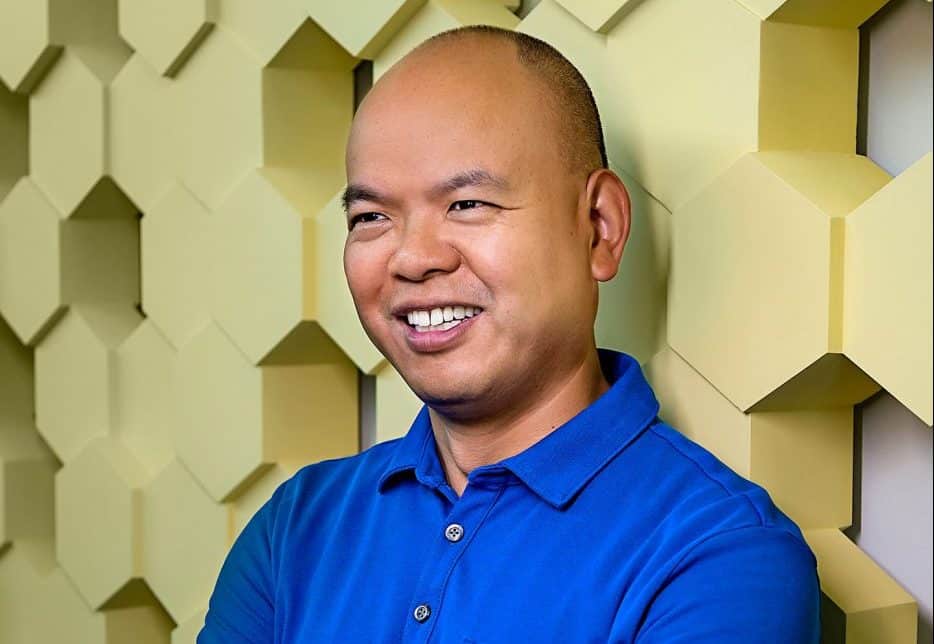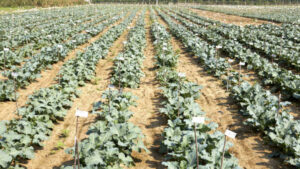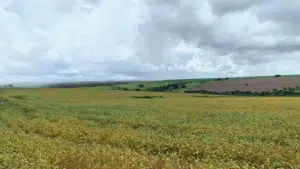The 2018 Future Giant of the seed industry excels not only because of his scientific expertise, but more so because of his ability to bring people together and to work toward a common goal.
As a child, 2018 Future Seed Giant Qingli Liu remembers running through the wheat field of his family’s small farm in his home country of China.
“I didn’t know anything about (wheat) rust until college. When you ran through the field, your pants turned yellow and that was normal. It wasn’t until I was in college that I realized how this affected the yield and quality of the crop, as well as my family’s economic situation,” he says.
Today, the Apex, North Carolina-based scientist serves as Syngenta’s project lead for soybean and sunflower disease control, with work focused on bringing broad resistance into many of Syngenta’s varieties.
His work alone, however, wasn’t the deciding factor in his nomination for the Future Seed Giant award, as shared by his supervisor, Joseph Watts. Watts, a Syngenta research scientist and senior team leader, says that he nominated Liu because of his leadership and ability to draw on resources throughout the world.
“It is rare to make a major scientific discovery, but even rarer to drive that discovery forward into a viable product to solve an unmet need in the world,” he says.
Finding Science
From a young age, Liu knew that he was interested in engineering and science, but it wasn’t until college that he discovered his passion for plant science and physiology.
“I wasn’t thinking about working in agriculture until I got to college,” he says. “I discovered that I could major in plant protection and realized I could make a difference for farmers around the world, just like the small farm I grew up on in China.”
Earning both a Bachelor and a Master of Science degrees in China, Liu looked abroad in preparation to begin his doctorate, applying in Europe and the United States. Completing his doctoral work at the University of California, Davis, post-doctoral work at the University of North Carolina, Chapel Hill, and through his tenure with Syngenta, Liu has never regretted his decision to study in the U.S.
Finding a Niche
“One of my mentors once told me that you should always work on a major disease associated with a major crop so that you can make the most difference to the most people,” says Liu.
Following that guidance, Liu currently devotes his time to the research and the development of innovative biological remedies to Asian Soybean Rust, a disease that inflicts billions of dollars of damage on global soybean production.
The project, he says, wasn’t one that he and his team had to go in search of. The disease created the opportunity because of the detriment it causes to soybean crops around the world.
“In 2004, there was a lot of concern in North America about Asian Soybean Rust. Not many knew what the cost would be to manage the disease or if an effective management was possible if the disease were to spread to all of the main soybean states in the U.S.,” Liu says. “It is rare that you see a disease with this type of significant impact.”
Making a Leader

“Building a project like this from the ground up is an endeavor that a scientist needs to be willing to stake their career on,” Liu says. “You’re looking at a 15-year timeline, and you don’t know if the disease will still be relevant in 15 years.”
The expectations of operationally delivering a market-applicable and affordable product, and the development of the protocol necessary to ensure those things, were also new challenges for Liu. However, it is these challenges, along with the many others he has faced, that Liu credits with the development of his leadership style and the effective communication strategies that led to his nomination for the Future Giant Award.
“In the earliest years, before the project was a project, and not officially funded, we had to brainstorm and determine how the project was going to work,” he says. “That requires a lot of time. Being a good communicator was important, because I was sharing that this was something important to our industry and to farmers around the world. I was building the trust of my peers and supervisors, sharing that this was something I believed in.”
While trust and communication were pivotal in the launch of the project, Liu says results are the driver that sustain a project through completion. And his team, he shares, has seen great results. Those successes, including the data the team has been able to collect in a relatively short amount of time, have kept the project moving forward.
Liu is also quick to point out that while he accepted the Future Giant of the seed industry award, the work he does is wholly a team effort, with every team member holding stake in the project.
“All of those successes come from teamwork,” he says. “We have a diverse team that covers the expertise needed at each stage of the project and that’s really how we can deliver results.”
With his team spanning many countries and continents, and engaged in a plethora of professional fields, Liu has not met many of those with whom he works on a daily basis. That is a communication challenge that many would find limiting.
“There are many people on my team whom I have never met, but the way we work together — it just works,” he says. “Some say that I should go there (to each team members’ location) and meet all of them. I say that those budget dollars can be spent differently. They follow the protocol that I created and deliver what I expect. I don’t need to go there.”
Regularly scheduled team meetings and updates also help Liu stay apprised of what’s happening at each phase of the project, helping him gain insight into each aspect of the team’s work.
“I’m not going to tell my team what to do or how to do it. I want them to look at the data and tell me how it should be done next time if something isn’t working,” he says. “There is so much trust in our project team. We look critically at ourselves and our work to find a better way every time we approach a project.”
Engaging and maintaining that engagement is another contributing factor to the leadership success Liu has seen, as well as continually working toward value-added dialogue that helps to create idea sharing and innovation within the different facets of his team.
“I challenge my project team: We need to look within ourselves, and what we are doing. There is always decision making — without decisions, you will still be at the same point you were a month ago,” he says. “Decisions always require scientific and data-driven discussions to make educated choices collectively.
“I like pushback, and I look for it in our conversations so that I can hear different opinions.”
Finding Empowerment
“Today’s culture at Syngenta is one of empowerment, to do the right thing and find success,” says Liu.
He says that through continued empowerment, Syngenta’s employees think differently and more broadly. Ultimately, that thinking helps to create future leaders.
“One of the benefits of the Syngenta culture is building credibility for what we are doing together, as one company-wide team. Goals are always broader, thinking of the entire industry, and not just the current project,” says Liu. “It allows our teams to deliver, and delivering results helps to create more empowerment within the company’s culture.”
Developing his leadership skills, Liu says that Syngenta enabled him to be brave in his approach, taking chances that have served him well as an engineer and that, combined with his love for helping people, has been key to his success in helping deliver Syngenta solutions into the hands of farmers.
“The authentic sincerity in what we do and how we do it: developing technology for farmers, is exciting and helps not just me, but all of our Syngenta colleagues deliver the best solutions we can in every project. We advance plant innovations to growers around the world, bringing plant potential to life.”
If you’d like to¬†nominate¬†a Future Giant of the Seed Industry, please email¬†Alex Martin.












